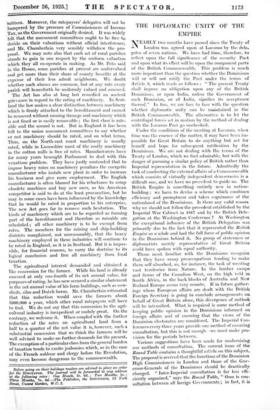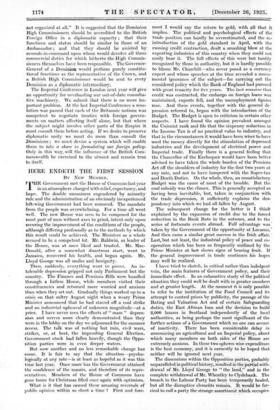THE DIPLOMATIC UNITY OF THE EMPIRE
NEARLY two months have passed since the Treaty of London was agreed upon at Locarno by the dele. gates of seven nations. We have had time, therefore, to reflect upon the full significance of the security Pact and upon what its effect will be upon the component parts of the British Commonwealth. This problem is much more important than the question whether the Dominions will or will not ratify the Pact under the terms of Article 9, which reads as follows : " The present Treaty shall impose no obligation upon any of the British Dominions, or upon India, unless the Government of such Dominion, or of India, signifies its acceptance thereof." In fine, we are face to face with the question whether diplomatic unity can be maintained in the British Commonwealth. The alternative is to let the centrifugal forces set in motion by the method of dealing with the Locarno Pact go unchecked.
Under the conditions of the meeting at Locarno, when time was the essence of the matter, it may have been im- possible for Great Britain to do anything but act for herself and hope for subsequent ratification by the Dominions. We are not dealing with the terms of the Treaty of London, which we find admirable, but with the danger of pursuing a similar policy of British rather than Imperial representation in the future. Admittedly the task of conducting the external affairs of a Commonwealth which consists of virtually independent democracies is a difficult one, and we have no precedent to guide us. The British Empire is something entirely new in nation- building ; we have to devise a scheme which combines efficiency and promptness and takes cognizance of the nationhood of the Dominions. Is there any valid reason why we should not follow the precedent established by the Imperial War Cabinet in 1917 and by the British Dele- gation at the Washington Conference ? At Washington the exceptional influence of the British Delegation was primarily due to the fact that it represented the British Empire as a whole and had the full force of public opinion in the Dominions behind it. No group of statesmen or diplomatists merely representative of Great Britain could have spoken with equal authority.
Those most familiar with the Dominions recognize that they have many preoccupations tending to make them self-absorbed, as, for instance, the task of wresting vast territories from Nature. In the lumber camps and farms of the Canadian West, on the high' veld in South Africa, in the back blocks of Australia and New Zealand Europe seems very remote. If in future gather- ings where European affairs are dealt with the British Foreign Secretary is going to conclude arrangements on behalf of Great Britain alone, this divergence of outlook will be intensified. What is required is some method of keeping public opinion in the Dominions informed on foreign affairs and of ensuring that the views of the Dominion electorates are considered. The Imperial Con- ferences every three years provide one method of ensuring consultation, but this is not enough—we must make pro- vision for the periods between.
Various suggestions have been made for modernizing our methods of consultation. The current issue of the Round Table contains a thoughtful article on this subject. The proposal is revived that the functions of the Dominion High Commissioners in London and those of the Gov- ernor-Generals of the Dominions should be drastically changed. " Inter-Imperial consultation is far less effi- ciently organized," says the Round Table, " than is con- sultation between all foreign Governments ; in fact, it is not organized at all." It is suggested that the Dominion. High Commissioners should be accredited to the British Foreign Office in a diplomatic capacity ; that their functions and status, should be similar to those of an Ambassador ; and that they should be assisted by seconds-in-command upon whom would devolve all those commercial duties for which hitherto the High Commis- sioners themselves have been responsible. The Governor- Genera/ of a Dominion would perform purely constitu- tional functions as the representative of the Crown, and a British High Commissioner would be sent to every Dominion as a diplomatic intermediary.
The Imperial Conference in London next year will give an opportunity for overhauling our out-of-date consulta- tive machinery. We submit that there is no more im- portant problem. At the last Imperial Conference a reso- lution vas passed that each of the Britannic nations was competent to negotiate treaties with foreign govern- ments on matters affecting itself alone, but that where the subject might involve other parts of the Empire it must consult them before acting. If we desire to preserve diplomatic unity we must do more than consult the Dominions ; we must devise a system which will enable them to take a share in formulating our foreign policy. Only in this way, will the influence of the British Com- monwealth be exercised to the utmost and remain true to itself.







































 Previous page
Previous page